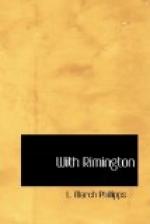“Nor could my weak arm
disperse
The host of insects gathered
round my head,
And ever with me as I walked
along.”
Carried on in a country like this, where a man on horseback is like a bird in the air, and by people so individually keen as the Boers, the present kind of war may go on indefinitely. After all, it is the sort of war the Boers understand best. The big-battle war is a matter of science which he had in a great measure to be instructed in, but this is a war which the natural independence of his own character and self-reliant habits make natural to him. The war, now that it has become a matter of individuals, is exciting all its old enthusiasm again, and the Burghers are up in arms in every district in the country. Fighting in their own country, the Boers have one advantage over us, which is their salvation: they can disperse in flight, but we cannot disperse in pursuit.
This vagrant form of war is more formidable than it sounds. These wandering bands can unite with great rapidity and deal when least expected a rapid blow. As we cannot catch them we must be prepared to receive them at all points. The veldt is a void to us, all darkness, and it hides a threat which, as it may fall anywhere, must be guarded against everywhere. This, what with all our garrisons and enormous lines of communication, means that the far greater part of our army has to act on the defensive; to sit still waiting for an enemy who may be a hundred miles off or behind the next hill. As for our wandering columns, they have about as much chance of catching Boers on the veldt as a Lord Mayor’s procession would have of catching a highwayman on Hounslow Heath. The enemy are watching us now from a rise a few miles away, waiting for our next move, and probably discussing some devilry or other they are up to. The line of our march is blotted out already. Where we camp one day they camp the next. They are all round and about us like water round a ship, parting before our bows and reuniting round our stern. Our passage makes no impression and leaves no visible trace. It does amuse me to read the speeches and papers in England with their talk of what we are to do with the country now we have conquered it. “With the conclusion of the war in South Africa arises the question,” &c., &c. It reminds one of a child’s game of make-believe. There is the same pompous air of reality. “This is the shop and you are the shopwoman. Good morning, Mrs. Snooks, I have come to buy a pound of sugar.” Unfortunately the facts remain. I find that some of the shrewdest onlookers out here are just beginning to feel a sort of half doubt whether we shall ever conquer the country at all. It depends on whether the home Government and press give up their babyish “let’s pretend” attitude and face the difficulties of the situation.
All this is very sad and lugubrious, is it not? and I daresay you think me a croaker; but there is a melancholy satisfaction in trying to see things as they are, and I believe what I have told you is nearer the truth than what you get from the papers. I only hope I may turn out to be wrong.




